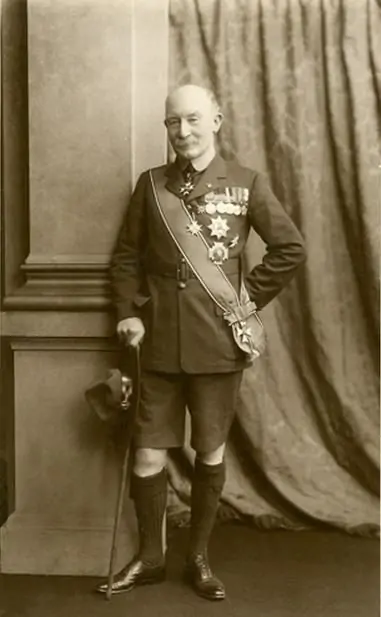
Submitted by Neil Duncan of the 8th Darlington (Cockerton Green) Scout Group.
Lieutenant-General Robert Stephenson Smyth Baden-Powell, 1st Baron Baden-Powell, OM, GCMG, GCVO, KCB, DL was born in 1857 and had a long and illustrious military career, as well as having a profound impact on civilian life for generations of young people.
Baden-Powell spent most of his military service in India and Africa where he honed his Scouting skills and began writing training manuals which would later be the basis for the Scouting Movement from 1908. One of his most famous commands was during the Seige of Mafeking in 1899 when a small garrison held out for 277 days and a ‘Cadet Force’ was drawn up take over small but important jobs to allow the adults to fight. These Cadets gain an honourable mention in the opening chapter of Scouting For Boys.
He returned to England to take up a post as Inspector-General of Cavalry in 1903. From 1908-10 he was in command of the Northern Territorial Army. During this appointment, Baden-Powell selected the location of Catterick Garrison to replace Richmond Castle which was then the Headquarters of the Northumbrian Division. His plan was brought to fruition following the outbreak of the First World War. The original concept was for a temporary camp to accommodate 2 complete divisions, 40,000 single men in 2,000 huts.
On the outbreak of World War I in 1914, at the age of fifty-seven, Baden-Powell put himself at the disposal of the War Office. Lord Kitchener said: “he could lay his hand on several competent divisional generals but could find no one who could carry on the invaluable work of the Boy Scouts”.
Explore more memories from the ribbon
-
Robert William Watson
Submitted by Jon Bemrose. Robert William Watson was the Fourth son of Alfred and Annie Watson, of 15, Ashville St., Bridlington. Before the outbreak of hostilities he was a fireman of the North Eastern Railway at Bridlington. 241608 Private Robert Watson served in the 5th Battalion Yorkshire Regiment and died on 28th October 1917 aged 21. His name is inscribed on the Tyne Cot Memorial in Belgium and on the cenotaph in Bridlington.
-
Herbert Lawson Riley
Midshipman Herbert Lawson Riley Ann Luxmoore came to one of our drop-in sessions at The Station to tell us about her Uncle, Herbert Lawson Riley. At the age of 15 years and 7 months, Herbert is not only probably the youngest serviceman from Richmond to die during the First World War, but he was also the first. Herbert was the grandson of Sir John Lawson of Brough Hall. He initially attended the Royal Naval College at Osborne on the Isle of Wight before becoming a Cadet at Dartmouth Naval College. On the outbreak of war in August 1914 Herbert was appointed to the patrol cruiser HMS Aboukir, becoming a Midshipman shortly afterwards. HMS Aboukir, along with sister-ships HMS Hogue and HMS Cressy were sent to the Hook of Holland to patrol the North Sea coast. At 6.25am on 22nd September 1914 the Aboukir was hit by a German torpedo – while the cruiser was listing badly Herbert jumped into the sea and managed to make it to one of the lifeboats. Finding apparent safety on board the Cressy, Herbert and his surviving shipmates began to recover in the ship’s sickroom. Disaster struck a second time. HMS Cressy was hit twice by the same German submarine that had sunk the Aboukir. Herbert Lawson Riley was last seen clinging on to wooden wreckage along side one of his closest friends. All three patrolling cruisers were sunk with the loss of more than 1400 lives.
-
Batchie Griffiths
Elizabeth Jane Griffiths known as Batchie Born in Llandingat, Carmarthenshire, in 1899. Batchie was enrolled with the Red Cross at the age of 18 and served as a VAD for just over a year. She was stationed at Catterick Military Hospital as a clerk. After her time at Catterick Camp, she returned to North Wales and married Emlyn James. Just before Christmas 1946, the British authorities relaxed the rules on contacts between British people and German prisoners of war. Emlyn and Batchie James were among the many British families who invited German prisoners to their home on Christmas day. From then on they invited two German prisoners from the camp at Castle Martin to their home in Pembroke every fortnight. Each time a prisoner was moved to a different camp, another would take his place, and so over time they got to know many Germans. Batchie and Emlyn received a letter from the Secretary of State for War refusing permission for two German prisoners of war, Helmut Grothe and Joachim Becker, to visit before returning to Germany. These two prisoners had been among those whom Emlyn and Batchie James had invited to their home in Pembroke. This information provided by Alathea Anderssohn (granddaughter of Batchie Griffiths) has been drawn from the Imperial War Museum’s ‘Lives of the First World War’ archive.
